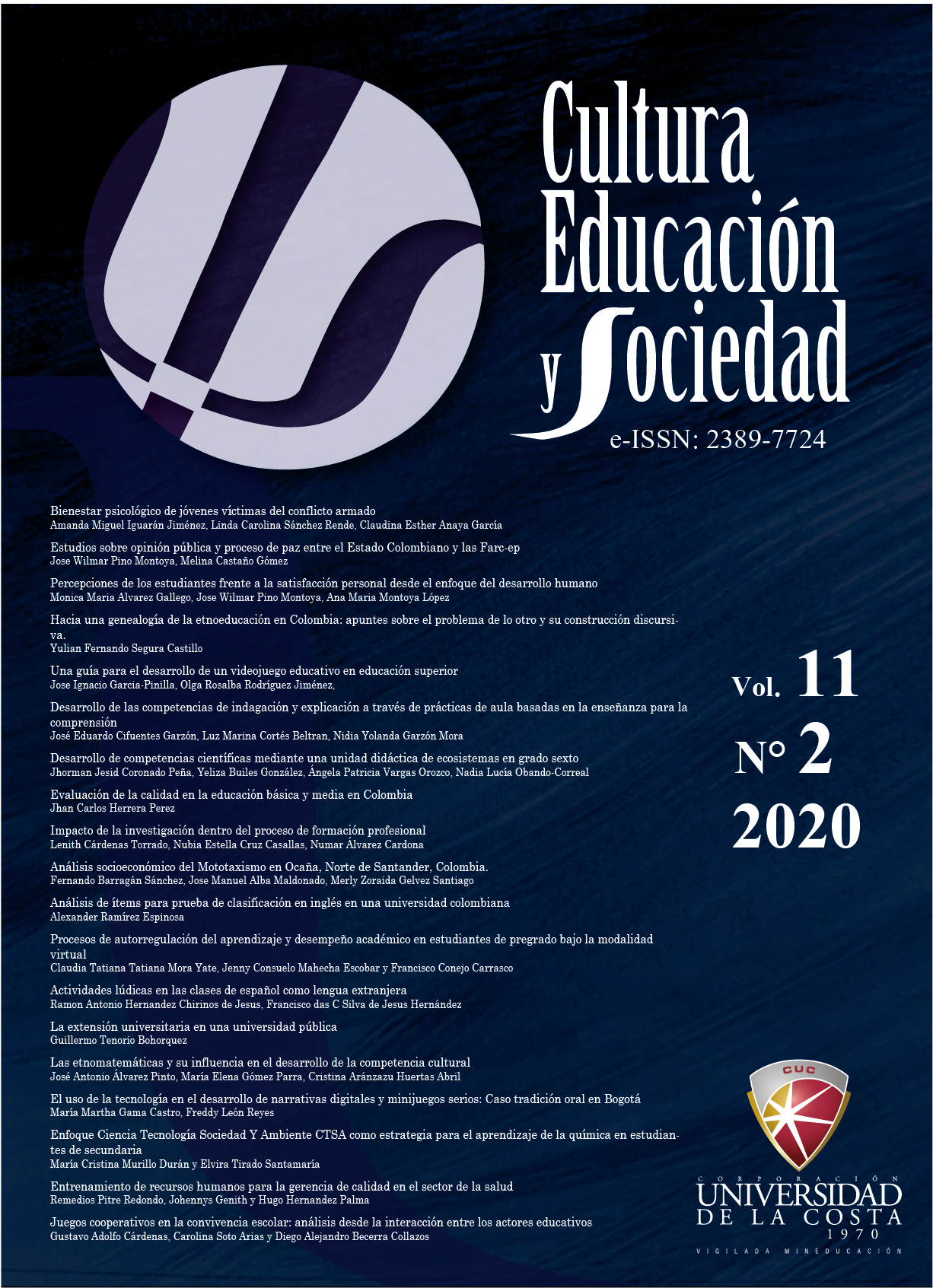Auto regulation of learning an academic performance in undergraduate students under virtual learling
DOI:
https://doi.org/10.17981/cultedusoc.11.2.2020.12Keywords:
Auto regulation, Motivation, Autonomous learning, Academic performance, Learning strategies, Virtual learningAbstract
In the virtual educational context, the processes of Auto regulation of learning play a very important role since they are considered as a tool that allows the student to reach his academic achievements. This article sought to analyze the relationship between auto regulation processes of learning and the academic performance of undergraduate students in children's pedagogy in the subject of social and cultural anthropology in a private universito. This study developed a qualitative methodology with a descriptive design with a sample of 10 students and 2 teachers. The results indicate that the auto regulation factors of learning that enhance academic performance are the processes of motivation, pedagogical strategies, processes of selfconcept. It was determined that, although students have processes of self-regulation of learning, these should be strengthened.
Downloads
References
Alegre, A. (2014). Autoeficacia académica, autorregulación del aprendizaje y rendimiento académico en estudiantes universitarios iniciales. Propósitos y representaciones, 2(1), 79–120. http://dx.doi.org/10.20511/pyr2014.v2n1.54
Álvarez-Gayou, J. (2013). Como hacer una investigación cualitativa. Fundamentos y metodología. México, D.F.: Paidós.
Bandura, A. (1977). Self-efficacy: Toward unifying theory of behavior change. PsychologicalReview, 84(2), 191–215. http://dx.doi.org/10.1037/0033-295X.84.2.191
Canto, J. E. (2011). Autoeficacia y educación. Educación y ciencia, 2(18), 45–53. Disponible en http://www.educacionyciencia.org/index.php/educacionyciencia/article/view/142
De Acedo, M. (2010). Competencias cognitivas en educación superior. Madrid: Narcea. http://dx.doi.org/10.4995/redu.2013.5541
García-Cabrero, B., Serrano, L., Cisneros, E., Arroyo, C., Díaz, E. y Vigil, M. H. (2018). Las competencias docentes en entornos virtuales: Un modelo para su evaluación. Revista Iberoamericana de Educación a Distancia, 21(1), 343–365. http://dx.doi.org/10.5944/ried.21.1.18816
Hernández, A. y Camargo, Á. (2017). Autorregulación del aprendizaje en la educación superior en Iberoamérica: una revisión sistemática. Revista Latinoamericana de Psicología, 49(2), 146–160. https://doi.org/10.1016/j.rlp.2017.01.001
Jiménez, M. (2000). Competencia social: intervención preventiva en la escuela. Revista Infancia y Sociedad, (24), 21–48. Disponible en https://dialnet.unirioja.es/servlet/articulo?codigo=4353980
Klimenko, O. y Alvares, J. L. (2009). Aprender cómo aprendo: la enseñanza de estrategias metacognitivas. Educación y educadores, 12(2), 11–28. Disponible en https://personaybioetica.unisabana.edu.co/index.php/eye/article/viewFile/1483/1652
Mora, R. T. (2015). Factores que intervienen en el rendimiento académico universitario: Un estudio de caso. Opción, 31(Especial 6), 1041–1063 Disponible en http://hdl.handle.net/10045/52320
Moreno, O. (2015). Evaluación de la modalidad de interacción de la tutoría y los efectos en logro académico en entornos en línea. RIED: Revista Iberoamericana de Educación a Distancia, 18(1), 231–255. Disponible en http://e-spacio.uned.es/fez/eserv/bibliuned:revistaRied-2015-18-1-7110/evaluacion_modalidad.pdf
Muchiut, Á. F., Zapata, R. B., Comba, A., Mari, M., Torres, N., Pellizardi, J. y Segovia, A. P. (2018). Neurodidáctica y autorregulación del aprendizaje, un camino de la teoría a la práctica. Revista Iberoamericana de Educación, 78(1), 205–219. https://doi.org/10.35362/rie7813193
Nocito, G. (2013). Autorregulación del aprendizaje de alumnos de grado. Estudio de caso [Doctoral dissertation]. Universidad Complutense de Madrid, Madrid, España.
Panadero, E. y Alonso-Tapia, J. (2014). Teorías de autorregulación educativa: una comparación y reflexión teórica. Psicología educativa, 20(1), 11–22. https://doi.org/10.1016/j.pse.2014.05.002
República de Colombia. MEN. (2016). Educación virtual o educación en línea. [Online]. Disponible en https://www.mineducacion.gov.co/1759/w3-article-196492.html?_noredirect=1
Salinas, F., Bodensiek, A., Lucio, R. y Molina, A (2010). Estudio sobre los Factores que influyen en el rendimiento escolar. Bogotá, D.C.: Secretaria de Educación Distrital. [Online]. Disponible en https://evaluacion.educacionbogota.edu.co/files/Factores%20que%20influyen%20en%20el%20rendimiento%20escolar.pdf
Vélez, A. y Roa, C. N. (2005). Factores asociados al rendimiento académico en estudiantes de medicina. Educación médica, 8(2), 24–32. https://doi.org/10.4321/S1575-18132005000200005
Véliz, A., Paris, A. y Sandoval, S. (2016). Relacion entre autoconcepto, autoeficacia académica y rendimiento académico en estudiantes de salud de Puerto Montt, Chile. Educadi, 1(1)97–109. Disponible en http://portalrevistas.uct.cl/index.php/educadi/article/view/1003
Published
How to Cite
Issue
Section
License
Copyright (c) 2022 CULTURA EDUCACIÓN Y SOCIEDAD

This work is licensed under a Creative Commons Attribution-NonCommercial-NoDerivatives 4.0 International License.
![]()
Creative Commons 2020 CULTURA EDUCACIÓN Y SOCIEDAD
This article is under international license Creative Commons Reconocimiento-NoComercial-SinObrasDerivadas 4.0.
The published articles are the sole responsibility of their authors and do not necessarily reflect the opinions of the editorial committee.
CULTURA EDUCACIÓN Y SOCIEDAD respects the moral rights of its authors, who assign to the editorial committee the patrimonial rights of the published material. In turn, the authors inform that this work is unpublished and has not been previously published.
All articles are under a:
Licencia Creative Commons Atribución-NoComercial-SinDerivadas 4.0 Internacional.
![]()


 English
English
 Español (España)
Español (España)




_12.53_.27_p_. m_._3.png)





_12.57_.35_p_. m_._3.png)
_12.50_.37_p_. m_._3.png)



